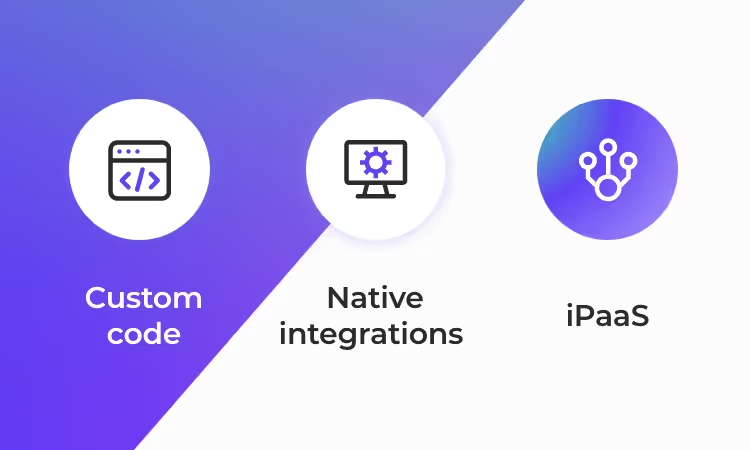Top iPaaS market trends 2025: The future of integration platforms is here
The numbers don't lie: iPaaS solutions are becoming the backbone of modern digital operations. The Integration Platform-as-a-Service market size is expected to reach USD 17.55 billion in 2025 and grow at a CAGR of 35.23% to reach USD 79.38 billion by 2030. This isn't just growth; it's a fundamental shift in how businesses think about connecting their technology ecosystems.
What makes these statistics even more compelling is the breadth of adoption. We're not talking about just enterprise giants anymore. Mid-market companies and even smaller organizations are discovering that hybrid integration platforms offer the scalability and flexibility they need to compete in today's fast-moving digital landscape.
AI-powered integration is transforming the iPaaS landscape
Perhaps the most exciting trend reshaping the iPaaS provider ecosystem is the integration of artificial intelligence and machine learning capabilities. The future of iPaaS is being shaped by the increased adoption of artificial intelligence and machine learning to enhance data analytics and process automation, the growing need for real-time data processing, and the expansion of IoT integration.
AI-powered integration platforms are moving beyond simple data transfer to intelligent automation that can predict integration failures, optimize data flows, and even suggest new integration opportunities. This isn't science fiction; it's happening right now, and the early adopters are seeing dramatic improvements in operational efficiency.
What's particularly interesting is how AI is making integration platforms smarter about error handling. Instead of simply alerting you when something breaks, modern AI-enhanced iPaaS solutions can often fix issues automatically or provide detailed remediation suggestions that non-technical users can implement.
Low-code and no-code platforms are democratizing integration
The rise of citizen developers is one of the most democratizing forces in technology today, and iPaaS is riding this wave hard. Gartner predicts that by 2025, 70% of new apps will be built using low-code/no-code tools, nearly three times the rate seen in 2020.
This trend is revolutionary because it breaks down the traditional barriers between business users and IT departments. Marketing teams can now set up their own integrations between their email platform and CRM. Sales teams can connect their pipeline tools without waiting weeks for IT resources. In 2025, no-code integration solutions will be the reigning champions of the tech world, serving as DIY kits for entrepreneurs who would rather not spend their weekends wrestling with complicated code.
The impact goes beyond convenience. When business users can handle their own integrations, IT teams are freed up to focus on more strategic initiatives. It's a win-win that's accelerating digital transformation across industries.
Industry-specific iPaaS solutions are gaining traction
Generic, one-size-fits-all integration platforms are giving way to specialized solutions designed for specific industries. A key trend poised to gain momentum is the rise of industry-specific iPaaS solutions, with businesses increasingly contacting platforms that cater specifically to their operational needs, offering enhanced precision and tailored functionalities.
This specialization makes perfect sense when you consider the unique challenges different industries face. Healthcare organizations need HIPAA-compliant integrations with strict audit trails. Financial services require robust security and regulatory compliance features. Manufacturing companies need real-time data synchronization with IoT devices and supply chain systems.
Industry-specific cloud integration platforms come pre-configured with the connectors, compliance features, and workflows that matter most to their target sectors. This reduces implementation time and eliminates the need for extensive customization.
Real-time data integration becomes non-negotiable
The era of batch processing and overnight data syncs is rapidly ending. Modern businesses operate in real-time, and their integration platforms need to keep up. Whether it's inventory levels updating across multiple sales channels, customer data synchronizing between support and sales teams, or financial data flowing between accounting systems, delays are no longer acceptable.
This demand for real-time integration is driving innovation in event-driven architectures and streaming data platforms. The most advanced iPaaS providers are building capabilities that can handle millions of real-time events while maintaining data consistency and system reliability.
Enterprise-grade security takes center stage
As integration platforms handle increasingly sensitive data, security has moved from an afterthought to a primary differentiator. In 2025, organizations will prioritize securing AI agents and associated APIs to ensure safe connections with enterprise data sources and automation processes.
Modern enterprise integration platforms are implementing zero-trust security models, advanced encryption protocols, and comprehensive audit trails. They're also adding sophisticated monitoring capabilities that can detect and respond to security threats in real-time.
The regulatory landscape is also driving security innovation. With GDPR, CCPA, and other data protection regulations becoming more stringent, businesses need integration platforms that can ensure compliance across all data flows.






















